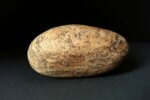I was at Ikea the other day with my wife. We have a couple of the Swedish superstores here in Israel.
We were in Netanya. Before we began our search for cheap towels, or as they say at IKEA, some Fräjens, we decided to get a bite to eat. After checking the first of the two cafes, we sought to venture to the other one, only to find a massive glass barrier that basically said, “You cannot pass.” I was expecting a troll to jump out. Instead, we had to make a massive circle to get to the other café.
Why the inconvenience? Well, it wasn’t just so we would have to pass up deals on Fyrkantigs or the Riktig Ölgas. We weren’t even tempted by the Grökullas. No, this had nothing to do with weirdly named Swedish home accessories, but it had everything to do with the Jewish kitchen.
You see, Jewish law forbids the mixing of milk and meat. We will get to the why in a minute. That means we have three types of restaurants in Israel:
- Halevy חלבי—dairy. These restaurants serve everything but meat products. Fish is cool.
- Basari בשרי—meat. These restaurants serve everything but dairy products. That means powder in your coffee and no cheesecake for dessert.
- Non-Kosher—Anything goes! These restaurants serve anything from shrimp to bacon to puppy dog stew (not really). They are not kosher and therefore have no rules.
However, in Ikea they had No. 1 and No. 2 and went to great lengths to separate them. But they also wanted to separate me and my wife. She got some soup at the Basari restaurant, while I wanted a salad from the Halevi restaurant. So Elana brought her soup over. When the Orthodox waitress protested, I said in Hebrew, “It’s okay … it is just soup.”
In a panic, as if a lighting bolt from heaven would strike us down, she said, “BUT THE UTENSILS ARE BASARI (for meat)!”
You see, in an Orthodox Jewish home, you must have two sinks, two sets of silverware and dishware. Why? To make sure that the meat dishes and utensils never come in contact with the milk ones. (Sometimes I wonder if in the middle of the night, they sneak out of their cupboards to frolic amongst themselves like in the Disney classic Beauty and the Beast.)
Anyway.
I have never hit a woman, but when she panicked over the idea that a meat utensil had made its way into the dairy area, at the same level as if an act of adultery or rape had been perpetrated, I was tempted. (OK, I wasn’t really tempted to hit her … but I wanted to write that I was.)
In the words of Glenn Beck, my head was about to explode. It just seemed so ridiculous, that in her mind and the mind of tens of thousands of Orthodox Jews in Israel, they confuse devotion to God with separating silverware.
I do believe this is what Paul meant when he wrote, “Brothers and sisters, my heart’s desire and prayer to God for the Israelites is that they may be saved. For I can testify about them that they are zealous for God, but their zeal is not based on knowledge” (Rom. 10:1-2).
I try with all my heart to respect other peoples’ beliefs and traditions, but these are the same people who teach their children that I, a Messianic Jew, am part of a cult! (My head just actually exploded, but I am using duct tape to keep it together.)
One thing I have maintained for many years is that if you are able to convince me that Yeshua is not the Messiah, I would not go running to Orthodox Judaism instead. I admit, there are many beautiful traditions in Orthodox Judaism (lighting Sabbath candles, weekly reading of the Torah, blessings over the bread and wine), but there are also some real bizarre ones that, in my humble opinion, would confuse anyone seeking a reason for why they are observed.
Here is an imaginary conversation:
Hey, I am new to this Jewish stuff and really want to please God, so can you help me?
Sure. Let’s talk about food, since you eat regularly. We never mix milk and meat. And you must wait six hours after eating meat or dairy, before you can eat the other.
Uh, what?
Oh, and if you find some meat in your teeth make sure to remove it … but you don’t have to wait six more hours. Be sure though to thoroughly rinse your mouth. And then, after eating, make sure to rinse your mouth again and wash your hands aggressively. Some spend as much as an hour washing their hands.
Huh?
Even if the smallest amount of food is swallowed, you must wait the full six hours. But if you don’t swallow, you can just do a thorough rinse and you’re good to go.
Where is this in the Bible?
Oh, it is very clear. There are three passages in the Torah that forbid cooking a baby goat in its mother’s milk—Exodus 23:19, 34:26 and Deuteronomy 14:21.
What does cooking a kid in its mother’s milk have to do with separating utensils or waiting six hours to eat meat after eating dairy? The two are not even remotely connected!
The reason God forbade the Israelites to cook a kid in its mother’s milk had nothing to do with food but worship. There is some proof that cooking a kid in its mother’s milk was a part of Canaanite pagan worship. Just like in other portions of the Torah, where God tells the children of Israel to abstain from certain pagan practices regarding worship (because it is pagan and has nothing to do with true devotion), He does so here as well.
While the Deuteronomy passage mentions this at the end of a passage that refers to the kosher laws, both Exodus passages are connected to blood sacrifice, which was part of worship.
Either way, it is a giant leap from not boiling a young goat in its mother’s milk to:
1. Never eating dairy and meat together.
2. Establishing a six-hour waiting period between eating the two.
3. Having two sinks in your kitchen.
4. Having two set of utensils.
5. Yelling at my wife in IKEA for bringing a meat spoon into a dairy area.
Ron Cantor is the director of Messiah’s Mandate International in Israel, a Messianic ministry dedicated to taking the message of Jesus from Israel to the ends of the earth (Acts 1:8). Cantor also travels internationally teaching on the Jewish roots of the New Testament. He serves on the pastoral team of Tiferet Yeshua, a Hebrew-speaking congregation in Tel Aviv. His newest book, Identity Theft, was released April 16. Follow him at @RonSCantor on Twitter.
For the original article, visit messiahsmandate.org.








Leave a Comment
You must be logged in to post a comment.